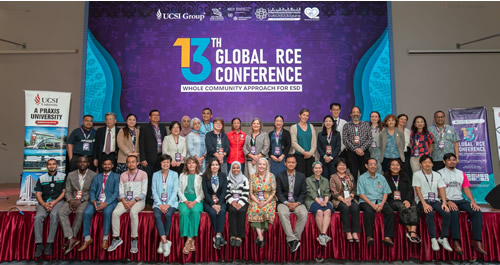 From 31 October to 2 November 2023, the 13th Global RCE Conference took place in Kuala Lumpur, Malaysia under the theme "Whole Community Approach for Education for Sustainable Development (ESD)". The three-day conference highlighted the importance of adopting a whole community approach, which involves collaborations among various stakeholders such as the education, government, and industry sectors, together with members of the community in advancing ESD. Among the 165 participants was CA Advisory Board member Jana Dlouhá, who represented the CA also in the Ubuntu Committee Meeting.
From 31 October to 2 November 2023, the 13th Global RCE Conference took place in Kuala Lumpur, Malaysia under the theme "Whole Community Approach for Education for Sustainable Development (ESD)". The three-day conference highlighted the importance of adopting a whole community approach, which involves collaborations among various stakeholders such as the education, government, and industry sectors, together with members of the community in advancing ESD. Among the 165 participants was CA Advisory Board member Jana Dlouhá, who represented the CA also in the Ubuntu Committee Meeting.
Written by: Jana Dlouhá (RCE Czechia and Charles University Prague)
The 13th Global RCE Conference was held from 31 October to 2 November 2023 in Kuala Lumpur, Malaysia, hosted by the International Islamic University Malaysia and co-hosted by RCE Greater Gombak and RCE Greater Kuala Lumpur. The event was attended by 165 face-to-face participants and 41 online participants, representing 43 RCEs from 39 countries. The conference program included four panel discussions focusing on transformative learning, partnership and global movement, capacity building and youth empowerment for the whole community approach. Participants also visited a number of Real World Labs to see the whole community approach in action. The conference thus provided a unique opportunity to hear (in theory) and experience (in practice) the role of communities in sustainable development and the importance of education as a driving force for sustainability processes – as evidenced in the reflections of the debates.
The three-day conference highlighted the importance of adopting a whole community approach, which involves collaborations among various stakeholders such as the education, government, and industry sectors, together with members of the community in advancing ESD. The hosting university presented seven steps to embed SDGs that were experimentally implemented in IIUM – the process from which the others could learn was introduced by Prof. emeritus Tan Sri Dzulkifli Abdul Razak, Rector of IIUM and co-chair of RCE Greater Gombak. The seven steps include: (1) breaking silos (encouraging working together transcending disciplines to achieve IIUM’s mission of bringing about betterment for human life and civilisation); (2) creating a common platform through the SDGs flagships; (3) engaging the community – from the hand to the head to the heart in transforming the community; (4) introducing experiential learning – beyond the classroom and theories; (5) developing edu-action programmes which promote flexibility, empowerment, innovation and accountability; (6) humanising education through the roadmap to instil sympathy, empathy and compassion – bringing back the heart to education at IIUM; and (7) creating a new learning ecosystem with emphasis on community engagement.
At the end of the conference, RCE Awards were delivered to the RCEs with outstanding projects. The Frontiers Special Collection developed with the support of COPERNICUS Alliance members was among those honoured in this session.
Ubuntu Committee of Peers for the RCEs
From official minutes of the meeting adapted by Jana Dlouhá, 7 December 2023
One day before the RCE Global Conference, on 30 October 2023, the Ubuntu Committee Meeting was held. The Ubuntu Committee is made up of signatories to the Ubuntu Declaration (Johannesburg, 2002) who share its values, recognizing "the indispensable role of education in achieving sustainable development" through "impartment [of] knowledge, skills and values [necessary] to empower people to bring about changes". The Ubuntu representatives are supporting the development of the global network of RCEs helping to shape the RCE policy and providing feedback on the new RCE applications. The annual meeting of this Committee was dedicated to reflecting on the activities of the RCE network (with the support of the UNU Institute of Advanced Studies), and planning for the future.
The meeting was attended by the traditional actors associated with the RCE network1; what was different, was the active participation of the youth representatives of the regions of the world who were elected during the last year. Europe was thus represented by the regional coordinator Aujke Sina Ziljstra, who otherwise shares her responsibilities with two other youth representatives2. Prof. Shinobu Yamaguchi, Director of the UNU-IAS, opened the meeting by highlighting some of the outstanding initiatives of the global RCE community. The role of RCEs, developed over their nearly 20-year history, is to mobilize multi-stakeholder cooperation with universities and other educational institutions. In the recent past, UNU-IAS has worked with the RCE network to shape national and international policies, including those that underpinned COP26 in Glasgow, COP27 in Sharm El Sheikh and the UN Summit on Transforming Education in New York last year.
The existing RCE framework has inspired numerous initiatives in the (now existing) 190 RCEs around the world. UNU is systematically mapping their efforts in relation to the implementation of the SDGs, for example in the RCE Case Study Publication Series where examples of good practice in sustainable consumption and production were published in 20233. During the meeting, regional coordinators presented activities in their regions, including youth initiatives (evidence of which was provided by youth coordinators). The main achievements and challenges of the RCEs to date were then linked to each RCE strategic priority area within the RCE Roadmap.
In general, the youth is a relatively vulnerable actor – young people need a lot of support from their RCEs, such as the provision of the capacity building and leadership development programmes, recognition and communication of their efforts. The result of the discussion was that all RCEs should have youth coordinators who are supported by the regional advisors in various ways.
To obtain more evidence of RCE activities, UNU IAS has recently developed a questionnaire to be sent to all RCEs. Due to different RCEs having very different models of funding and functioning, "ranking" their efforts is neither possible nor desirable. Further activities planned by UNU IAS for 2024 include open calls, youth engagement, research and publications. The call for RCE applications will again be open from November 2023 to May 2024, with Ubuntu members and regional advisors being invited to assist in the application review process around October 2024. The subsequent Ubuntu meeting is scheduled for late 2024, to discuss the evaluation results.
1 The Ubuntu Committee Members (including Jana Dlouhá as a COPERNICUS Alliance representative), Regional Advisors to RCE Communities, and the representatives of the Global RCE Service Centre of the United Nations University Institute for the Advanced Study of Sustainability (UNU-IAS). Besides this, the hosting organizations – the International Islamic University Malaysia (IIUM) and the RCE Greater Gombak – were represented at the whole meeting. Similarly as last year, the representative of the Japan Ministry of the Environment from the Office of Environmental Education was present as an observer during the whole meeting.
2 Jorah d’Avigdor as the Community Manager, Aukje Sina Zijlstra as the Communication Officer, and Maximilian Eisenbart as the Policy Advisor.
3 Vaughter, P., Park, J. and Pham, N. (eds) (2023). Driving Sustainable Consumption and Production at the Local Level: Education for Sustainable Development Projects from the Global RCE Network. Tokyo: United Nations University, Institute for the Advanced Study of Sustainability (UNU-IAS). pp. 58-61. Online
